Vancouver, British Columbia: FIREWEED METALS CORP. (“Fireweed” or the “Company”) (TSXV: FWZ; OTCQB: FWEDF, formerly Fireweed Zinc Ltd.) is pleased to announce additional results from the 2022 drill program at Boundary Zone, Macmillan Pass zinc-lead-silver project, Yukon, Canada (Map 1).
Highlights
- A high grade and wide intersection of zinc mineralization in NB22-021 for 105 metres (m) of 8.4% zinc and 12.1 g/t silver starting from surface.
- A new stratiform zone in NB22-018 returned 8 m of 11.5% zinc, 1.7% lead, and 61 g/t silver.
- All holes completed hit zinc mineralization.
- Results from the last five (5) holes from Boundary Zone and nine (9) holes from the Tom deposit are pending.
CEO Statement
Brandon Macdonald, CEO, stated “Boundary Main Zone continues to impress with not only the wide tenor of mineralization but also with high-grade intervals. Equally important is the discovery of a new stratiform zone where we expect to see good continuity of mineralization consistent with similar zones at Tom, Jason and Boundary West. With a large drill campaign planned for the summer we are looking forward to testing the extents of mineralization in these zones and growing our already world-class metal endowment.”
Boundary Zone Drilling Results
The following drill results (Tables 1 and 2) are from seven (7) drill holes located at Boundary Zone (Maps 1 and 2), all within the Boundary Main area. The last results from five (5) holes from Boundary Main and nine (9) holes from the Tom zinc-lead-silver deposit 2022 drill program are still pending.
Table 1: Boundary Zone 2022 Drill Result Highlights from this News Release.
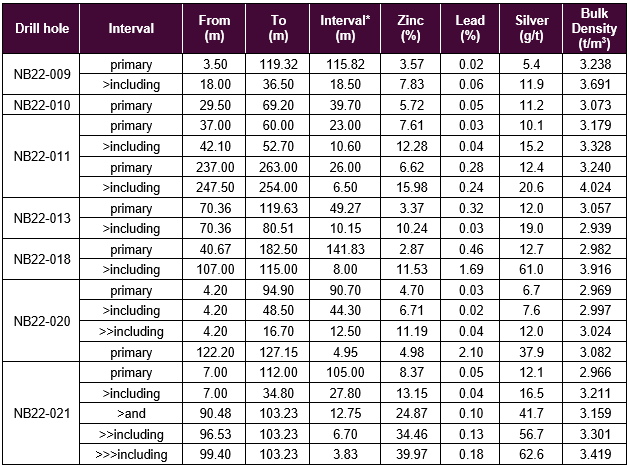
*Intersected thicknesses, not true thicknesses, are stated for all intersections in Table 1. Due to the early stage of drilling, true thicknesses cannot be accurately stated for these holes. Values in this table may differ slightly from the text due to rounding.
NB22-018, NB22-020 and NB22-021
These three (3) holes were collared from the same pad, forming a fan of holes that intersected high grade sphalerite-pyrite vein and breccia mineralization from surface to depths of up to ~100 m in the hangingwall of the Boundary Main Fault (Cross Section F-F’ and Map 2). Hole NB22-021 intersected 105 m of 8.4% zinc, and 12.1 g/t silver including both an intersection from surface grading 13.2% zinc and 16.5 g/t silver over 27.8 m and an intersection of spectacularly high-grade zinc mineralization grading 24.9% zinc and 41.7 g/t over 12.75 m including 3.83 m of 40.0% zinc and 62.6 g/t silver (see Image 1 and Tables 1 and 2). Holes NB22-018 and NB22-020 also intersected wide intervals of zinc mineralization in the near surface: 141.8 m of 2.9% zinc, 0.5% lead, and 12.7 g/t silver, and 90.7 m of 4.7% zinc, and 6.7 g/t silver, respectively.
Holes NB22-018 and NB22-020 penetrated the Boundary Main fault and intersected a new zone of stratiform zinc mineralization in black carbonaceous mudstones and diamictites comprising laminated, semi-massive, and massive sphalerite-pyrite grading 11.5% zinc, 1.7% lead, and 61.0 g/t silver over 8 m in NB22-018 and 5.0% zinc, 2.1% lead, and 37.9 g/t silver over 5 m in NB22-020 (see Cross Section F-F’, and Tables 1 and 2). This stratiform zone is interpreted to correlate stratigraphically with the Tom-Jason deposits. The stratiform zone is correlated spatially to zinc-lead mineralization in surrounding holes: in several holes to the east, it appears to be less mineralized and is interpreted as the fringes of the zone; whereas to the west, it appears to be significantly better mineralized in NB22-022 and NB22-023 and is interpreted to be the direction towards the feeder.
NB22-009 and NB22-011
These two (2) holes were collared from the same pad and include wide intervals of vein-hosted mineralization near surface at Boundary Main: NB22-009 returned 115.8 m of 3.6% zinc and 5.4 g/t silver, including 18.5 m of 7.8% zinc and 12.0 g/t silver from a downhole depth of 18 m; NB22-011 intersected 23 m of 7.6% zinc and 10.1 g/t silver including 10.6 m of 12.3% zinc and 15.2 g/t silver (see Cross Section G-G’, Map 2 and Tables 1 and 2).
Hole NB22-011 intersected zinc mineralization in the footwall of the Boundary Main Fault in volcaniclastic rocks for 26 m grading 6.6% zinc and 12.4 g/t silver including 6.5 m of 16.0% zinc and 20.6 g/t silver. This intersection represents a 60 m step out from similar mineralization in holes to the west. Drilling was unable to advance through the fault in hole NB22-009 due to adverse drilling conditions and the target in the footwall remains untested at this location.
NB22-010 and NB22-013
These two (2) holes were collared from the same pad as infill holes at Boundary Main (see Cross Section G-G’ and Map 2). Both holes successfully intersected sphalerite vein mineralization in the hangingwall of the Boundary Main fault. Hole NB22-010 intersected 39.7 m of 5.7% zinc and 11.2 g/t silver, including some higher-grade veins: 4 m of 13.5% zinc, 2.9 m of 12.8% zinc, 3.5 m of 10.1% zinc, and 3.7 m of 11.1% zinc (Table 2). Hole NB22-013 intersected 49.3 m of 3.4% zinc and 12.0 g/t silver including 10.2 m of 10.2% zinc and 19.0 g/t silver.
Data verification
The diamond drill core logging and sampling program was carried out under a rigorous quality assurance / quality control program using industry best practices. Drill intersections in this release are HQ3 (split tube) size core (61.1 mm / 2.406-inch diameter) or NQ2 size core (50.5 mm / 1.99-inch diameter) with recoveries typically above 85% unless otherwise noted in the table of results. After drilling, core was cleaned, scanned with a core scanning machine, logged for geology, structure, and geotechnical characteristics, then marked for sampling and photographed on site. The cores for analyses were marked for sampling based on geological intervals with individual samples 2 m or less in length. Drill core was cut lengthwise in half with a core saw; half-core was sent for assays reported in this news release, and the other half is stored on site for reference. Bulk density was determined on site for the entire length of each sample assayed by measurement of mass in air and mass in water. Sample duplicate bulk density determinations and in-house bulk density standard determinations were each made at a rate of 5%. Since 2017, four (4) in-house bulk density standards (mineralized drill core from the Tom deposit that span a range of densities) have been used and show an acceptable long-term precision. Certified standard masses are used to calibrate the scale balance used for bulk density determinations.
A total of 5% assay standards or blanks and 5% core duplicates are included in the sample stream as a quality control measure and are reviewed after analyses are received. Standards and blanks in 2022 drill results to date have been approved as acceptable. Duplicate data add to the long-term estimates of precision for assay data on the project and precision for drill results reported is deemed to be within acceptable levels. Samples were sent to the Bureau Veritas preparation laboratory in Whitehorse, Yukon, where the samples were crushed and a 500 g split was sent to the Bureau Veritas laboratory in Vancouver, British Columbia to be pulverized to 85% passing 200 mesh size pulps. Clean crush material was passed through the crusher and clean silica was pulverized between each sample. The pulps were analyzed by 1:1:1 Aqua Regia digestion followed by Inductively Coupled Plasma Mass Spectrometry (ICP-ES/ICP-MS) multi-element analyses (BV Code AQ270). All samples were also analyzed for multiple elements by lithium borate fusion and X-ray fluorescence analysis (XRF) finish (BV Code LF725). Over-limit Pb (>25.0%) and Zn (>24.0%) were analyzed by lithium borate fusion with XRF finish (BV Code LF726). Silver is reported in this news release by method AQ270, and zinc and lead are reported by LF725 or LF726. Bureau Veritas (Vancouver) is an independent, international ISO/IEC 17025:2005 accredited laboratory.
Results in this news release are length and bulk-density weighted averages as would be used in a Mineral Resource estimate. Readers are cautioned that in Fireweed news releases prior to 2020, only length weighted assay averages were reported which may result in slightly lower (under-reported) average values. Length and bulk-density weighted averages have been reported as these most accurately represent the average metal-content of the intersections.
Qualified Person Statement
Technical information in this news release has been approved by Fireweed Metals Chief Geologist, Jack Milton, Ph.D., P.Geo. (BC), and a ‘Qualified Person’ as defined under Canadian National Instrument 43-101.
About Fireweed Metals Corp. (TSXV: FWZ; OTCQB: FWEDF; FSE:20F): Fireweed Metals is a public mineral exploration company on the leading edge of Critical Minerals project development. Fireweed is well-funded, with a current cash position of C$38,600,000, and is well-positioned to carry out a large 2023 exploration program. The Company has three projects located in Canada:
- Macmillan Pass Zinc-Lead-Silver Project: Fireweed owns 100% of the district-scale 940 km2 Macmillan Pass project in Yukon, Canada, which is host to the Tom and Jason zinc-lead-silver deposits with current Mineral Resources and a PEA economic study (see Fireweed news releases dated 10th January 2018, and 23rd May 2018, respectively, and reports filed on sedar.com for details) as well as the Boundary Zone, Boundary Zone West, Tom North Zone and End Zone which have significant zinc-lead-silver mineralization drilled but not yet classified as mineral resources. The project also includes large blocks of adjacent claims with known showings and significant upside exploration potential. The large 2022 drill program utilizing four drills is complete and assay results are being announced as they are received and interpreted.
- Mactung Tungsten Project: The Company has a binding Letter of Intent to acquire 100% interest in the 37.6 km2 Mactung Tungsten Project located adjacent to the Macmillan Pass Project. Mactung contains historic resources that make it one of the largest and highest-grade undeveloped resources in the world of the Critical Mineral tungsten. Located in Canada, it is one of the rare large tungsten resources outside of China. Due diligence and validation work on historic data has been completed and a second phase of relogging and sampling of historic drill core has begun and will support a new mineral resource estimate.
- Gayna River Zinc-Lead-Gallium-Germanium Project: Fireweed has 100% of the 128.75 km2 Gayna River project located 180 km north of the Macmillan Pass project. It is host to extensive mineralization including Critical Minerals zinc, gallium and germanium as well as lead and silver, outlined by 28,000 m of historic drilling and significant upside potential. Results from the 2022 field program of geochemical sampling, airborne LiDAR topographic surveying and ground geophysics are now being interpreted toward defining drill targets.
In Canada, Fireweed (TSXV: FWZ) trades on the TSX Venture Exchange. In the USA, Fireweed (OTCQB: FWEDF) trades on the OTCQB Venture Market for early stage and developing U.S. and international companies and is DTC eligible for enhanced electronic clearing and settlement. The Company is current in its reporting, and undergoes an annual verification and management certification process. Investors can find Real-Time quotes and market information for the Company on www.otcmarkets.com. In Europe, Fireweed (FSE: 20F) trades on the Frankfurt Stock Exchange.
Additional information about Fireweed and its projects can be found on the Company’s website at FireweedMetals.com and at www.sedar.com.
ON BEHALF OF FIREWEED METALS CORP.
“Brandon Macdonald”
CEO & Director
Neither the TSX Venture Exchange nor its Regulation Services Provider (as that term is defined in the policies of the TSX Venture Exchange) accepts responsibility for the adequacy or accuracy of this release.
Cautionary Statements
Forward Looking Statements
This news release contains “forward-looking” statements and information (“forward-looking statements”). All statements, other than statements of historical facts, included herein, including, without limitation, statements relating to interpretation of drill results, future work plans, the use of funds, and the potential of the Company’s projects, are forward looking statements. Forward-looking statements are frequently, but not always, identified by words such as “expects”, “anticipates”, “believes”, “intends”, “estimates”, “potential”, “possible”, and similar expressions, or statements that events, conditions, or results “will”, “may”, “could”, or “should” occur or be achieved. Forward-looking statements are based on the beliefs of Company management, as well as assumptions made by and information currently available to Company management and reflect the beliefs, opinions, and projections on the date the statements are made. Forward-looking statements involve various risks and uncertainties and accordingly, readers are advised not to place undue reliance on forward-looking statements. There can be no assurance that such statements will prove to be accurate, and actual results and future events could differ materially from those anticipated in such statements. Important factors that could cause actual results to differ materially from the Company’s expectations include but are not limited to, exploration and development risks, unanticipated reclamation expenses, expenditure and financing requirements, general economic conditions, changes in financial markets, the ability to properly and efficiently staff the Company’s operations, the sufficiency of working capital and funding for continued operations, title matters, First Nations relations, operating hazards, political and economic factors, competitive factors, metal prices, relationships with vendors and strategic partners, governmental regulations and oversight, permitting, seasonality and weather, technological change, industry practices, uncertainties involved in the interpretation of drilling results and laboratory tests, and one-time events. The Company assumes no obligation to update forward‐looking statements or beliefs, opinions, projections or other factors, except as required by law.
Contact:
Brandon Macdonald
Phone: (604) 646-8361
Email: info@fireweedmetals.com
Map 1: Macmillan Pass Project and Mactung Project Locations.
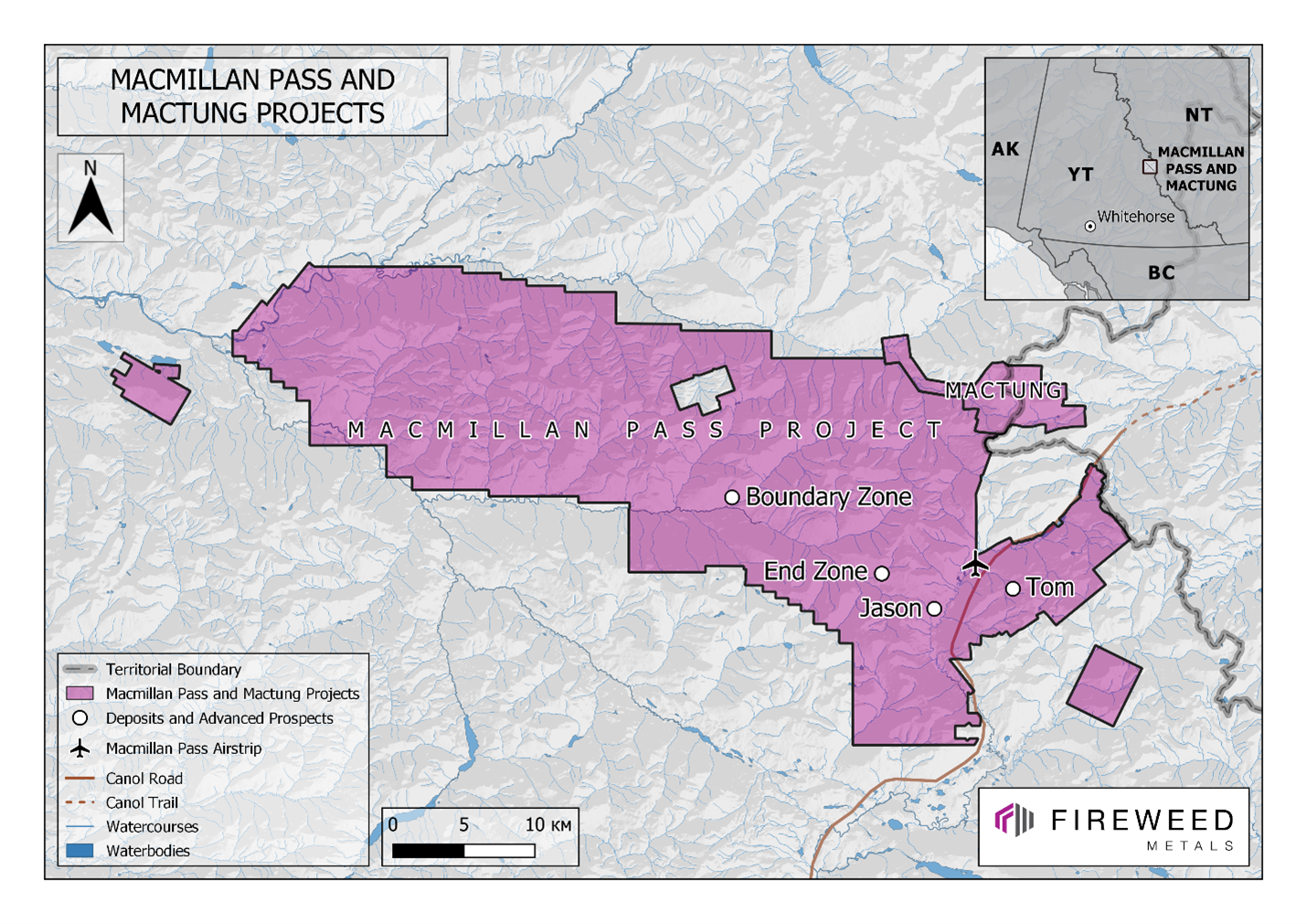
Map 2: Boundary Zone drilling map with holes in this news release labeled. Green lines refer to Cross Sections F-F’ and G-G’.
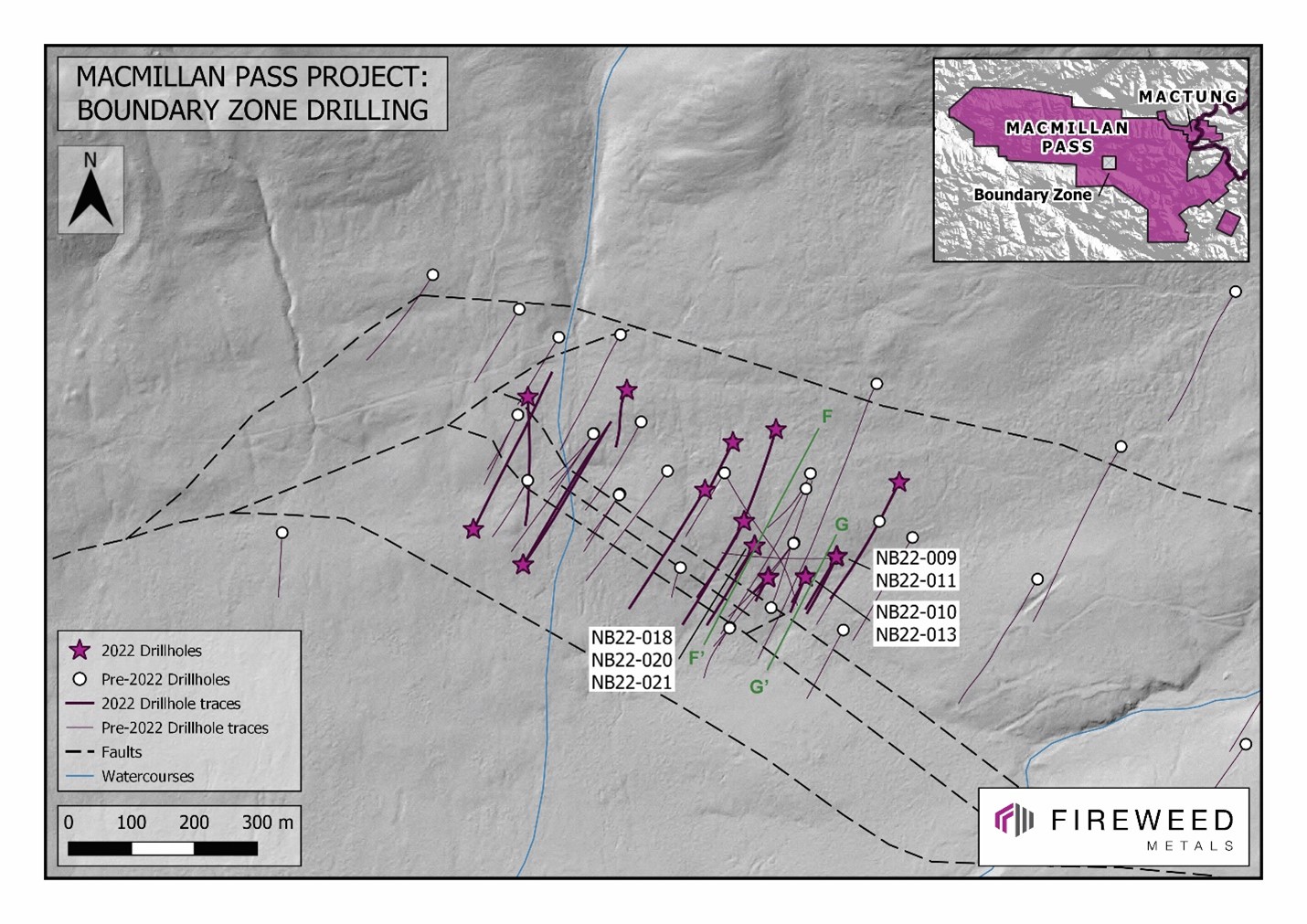
Image 1: Core from drill hole NB22-021 – 96.2 m to 102.9 m showing very high-grade veins and breccias with abundant red-brown sphalerite infill, from an interval (96.53 m to 103.2 m) of 6.7 m grading 34.5% zinc, 0.13% lead, and 56.7 g/t silver. Image is a from a very-high resolution core scanning photomosaic with core boxes and blocks masked.

Cross Section F-F’: Highlights of new results from holes NB22-018, NB22-020, and NB22-021. For complete results see Table 2. Section line runs through collar of NB22-021 at an azimuth of 202°. For results from NB21-005 see Fireweed news release dated November 18th 2021.
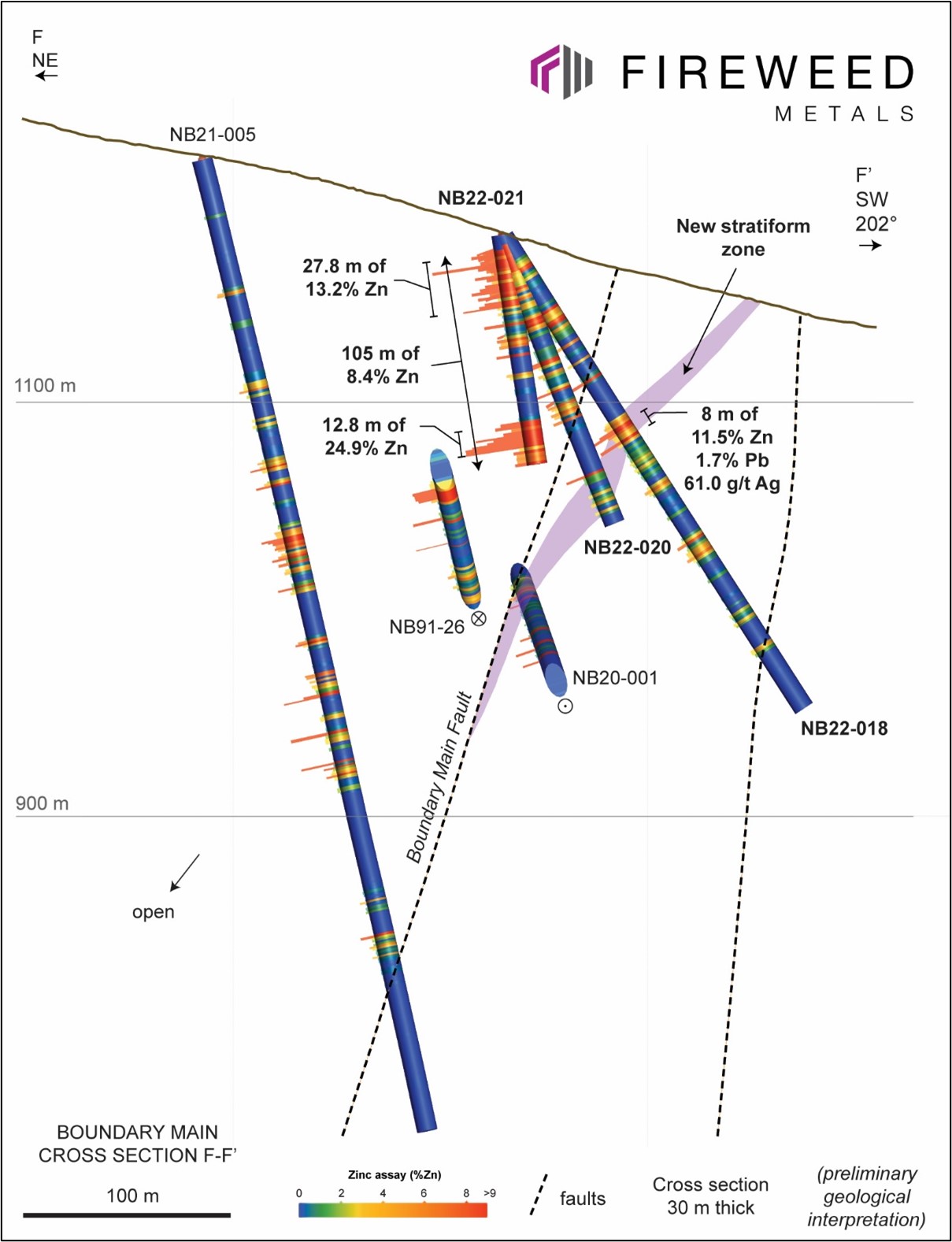
Cross Section G-G’: Highlights of new results from holes NB22-009, NB22-010, NB22-011 and NB22-013. For complete results see Table 2. Section line runs half-way between NB22-009 and NB22-010 at an azimuth of 209°.

Table 2: Boundary Zone 2022 Full Table of Drill Results from this News Release.
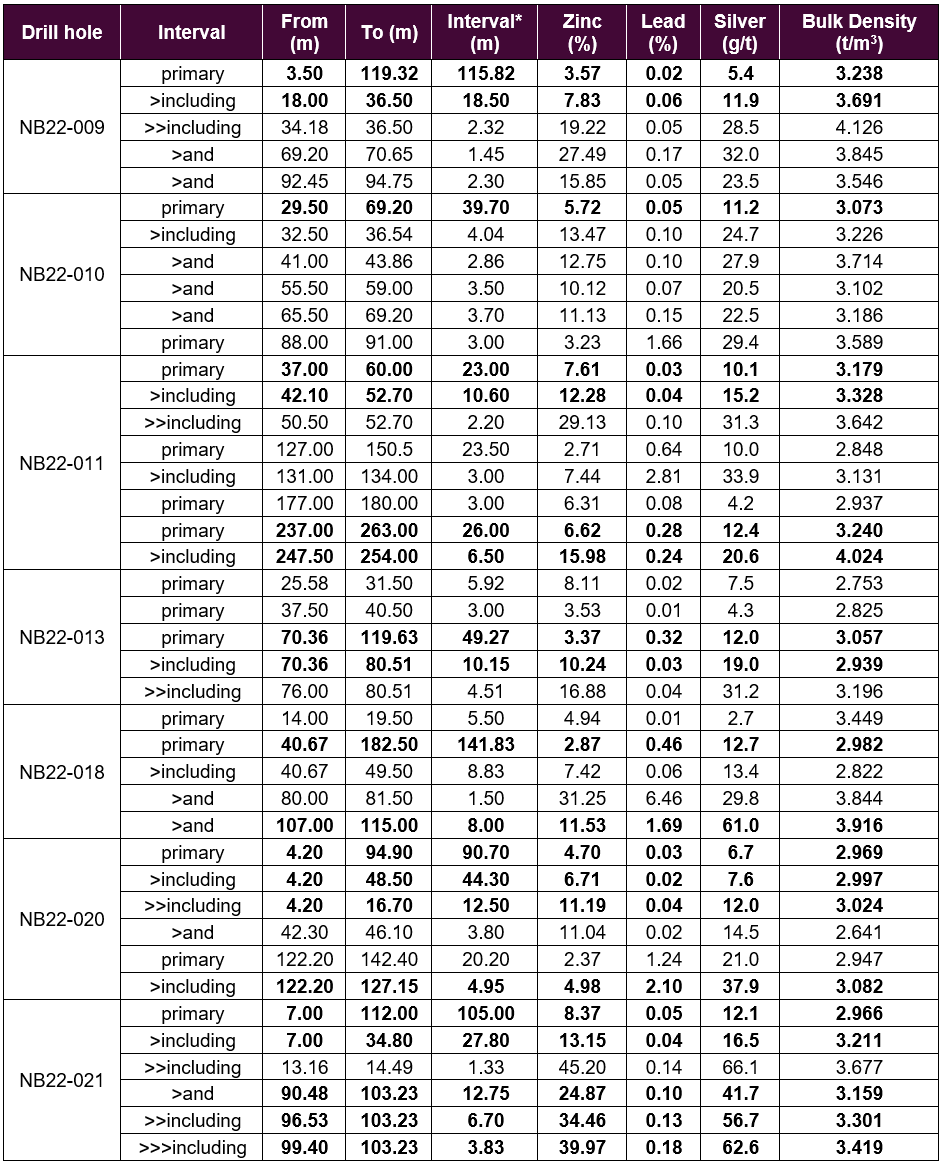
*Intersected thicknesses, not true thicknesses, are stated for all intersections in Table 2. Due to the early stage of drilling, true thicknesses cannot be accurately stated for these holes. Values in this table may differ from the text due to rounding.
Table 3: Summary of Drill Results from 2022 Program.
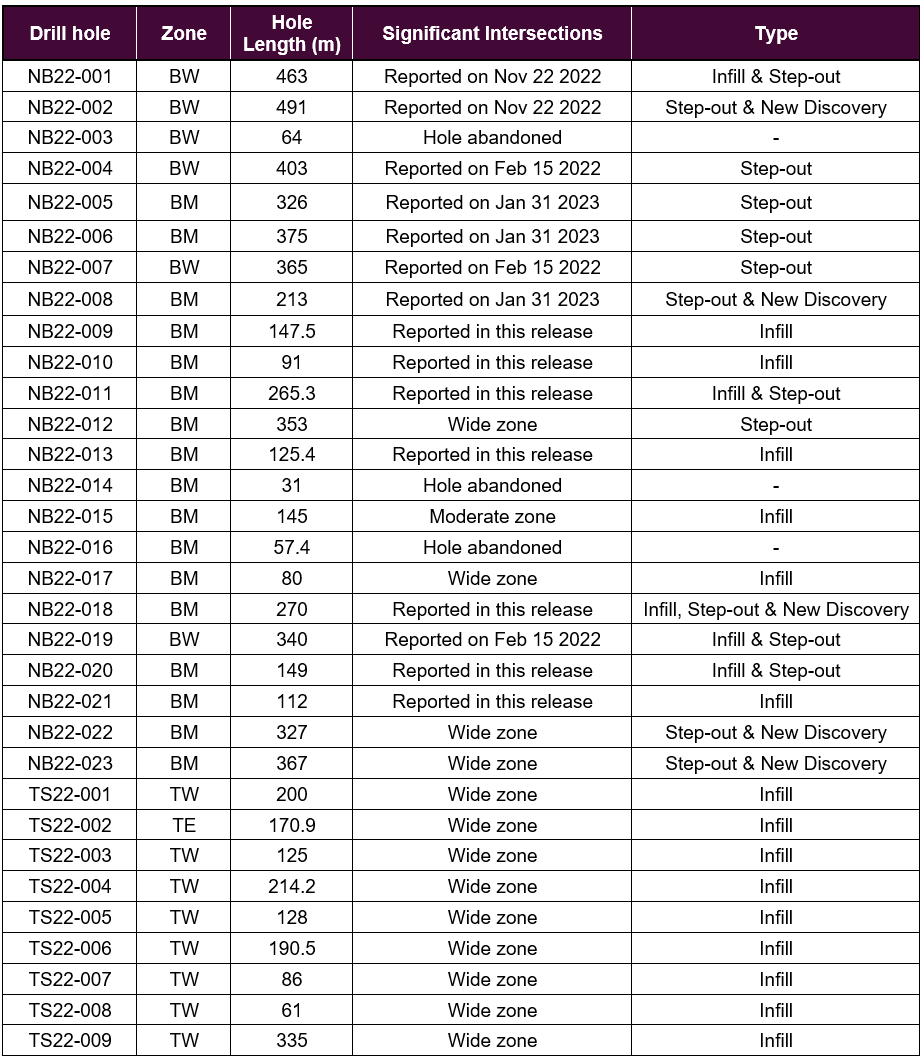
All assays pending unless otherwise indicated. BM: Boundary Main; BW: Boundary West; TW: Tom West; TE: Tom East.
Table 4: 2022 Drill Collar Details.
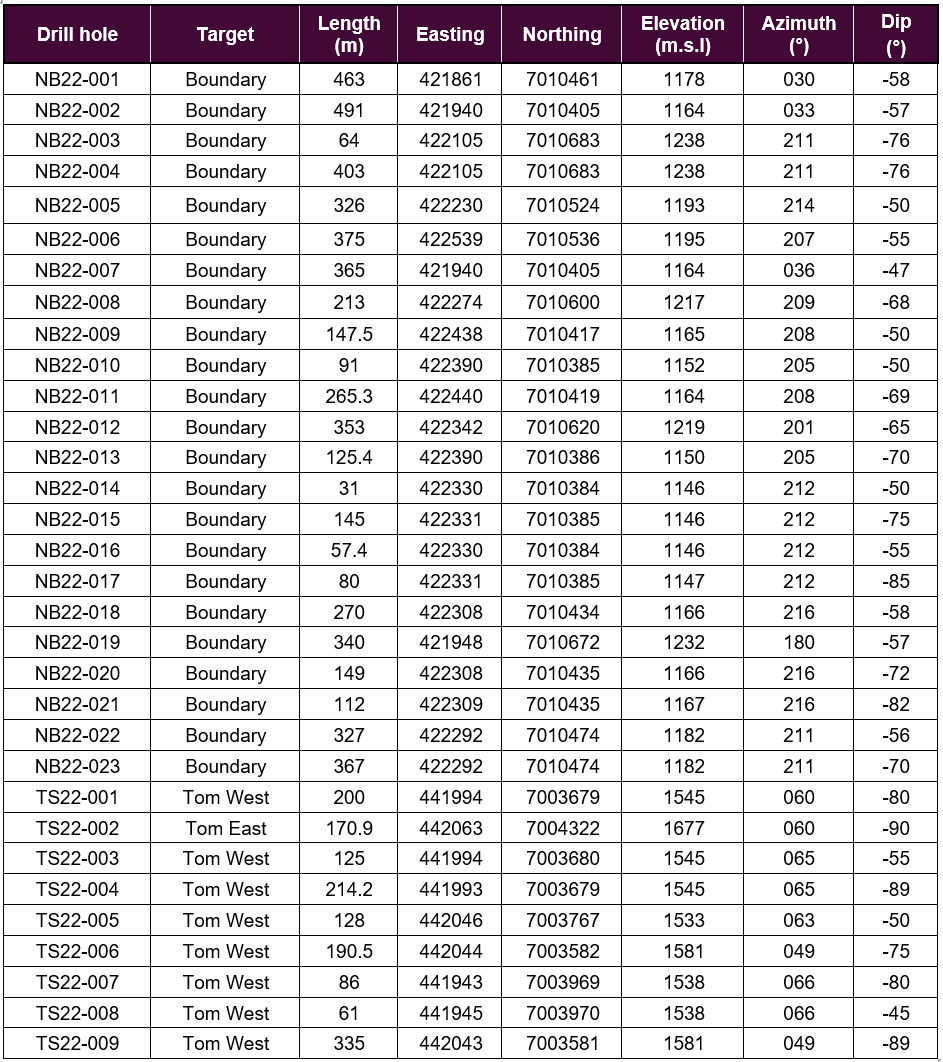
Coordinate reference system: UTM Zone 9 NAD83. North reference: UTM grid north.

